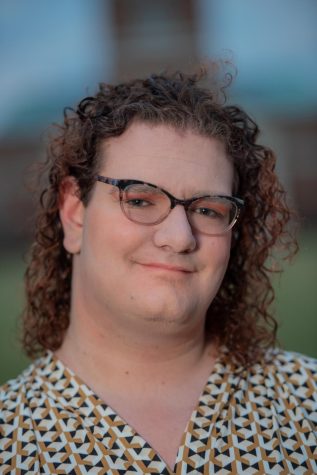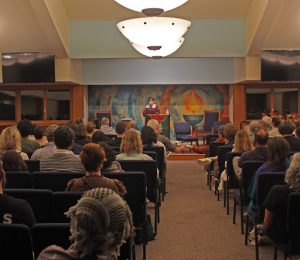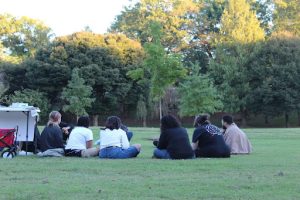UCC conducts ‘Healthy Minds’ student survey
Data collected from the survey will inform the UCC on how to improve their services
Signs across campus encourage students to complete the Healthy Minds survey.
January 28, 2022
The University Counseling Center (UCC) is conducting its biannual “Healthy Minds” survey from Jan. 24 to Feb. 18.
The survey asks students questions on topics such as anxiety, depression, eating disorders, trauma experiences and perceptions of belonging at college. The test is administered to students across the United States once every two years. Student responses are completely confidential.
“We also will use the data in aggregate to infer the needs of the student population,” Dr. Denisha Champion, Associate Director for Community Engagement at the UCC, said. “[Using the data,] we will make decisions about the types of services we need to provide or determine if our counseling center staff needs specialized training to better manage a particular concern the study results highlighted. There are a lot of possibilities, which is why we need students to fill out the survey.”
According to Champion, 30-35% of the student body needs to fill out the survey in order for the UCC to generalize the information they collect to the entire campus. To encourage student participation, the UCC will give a $5 Starbucks gift card to those who fill out the survey by Jan. 29.
Sophomore Anabel Ford shared her views on the importance of the survey.
“I think the survey is important to understanding the habits and tendencies of Wake Forest and other college-aged students and did a good job going in-depth with some of the questions,” Ford said.
Ford’s praise was not unqualified, however.
“I felt some questions were left open-ended and others didn’t give a lot of room for gray areas,” Ford said. “I’m really curious to see the results on a greater scale and how the university responds to the results.”
Champion provided the Old Gold & Black with an example of how the results may be used to enact “institutional change.”
“We are asking questions this year about ACES (adverse childhood experiences), which is essentially childhood trauma,” Champion said. “Once we have a sense of how many of our student population have experienced trauma, there is the possibility of using that data to advocate [for] implementing a trauma-informed campus approach. This is where we teach everyone how to best support and create nurturing and affirming spaces for those who are currently managing the results of unresolved trauma.”
Additionally, Vice President for Diversity and Inclusion Dr. José Villalba told the Old Gold & Black that results related to his office will be shared with him so he can help advocate for change.
After completing the survey, students are given the option to see a write-up of their results, including screening test scores for eating disorders, depression and anxiety. Champion emphasized that these scores are not a diagnosis.
“The Healthy Minds Survey is not a clinician and is not designed to diagnose individuals or conditions,” Champion said. “If a student is concerned that they scored high in an area, I would encourage them to reach out to the UCC to schedule a counseling session to discuss the concern. A licensed clinician will be able to more fully assess and offer a professional opinion as to whether or not a student meets criteria for a diagnosis.”
A campus-wide email sent out by Champion contains the link to the survey.













